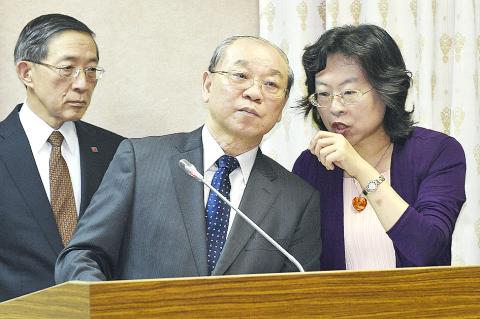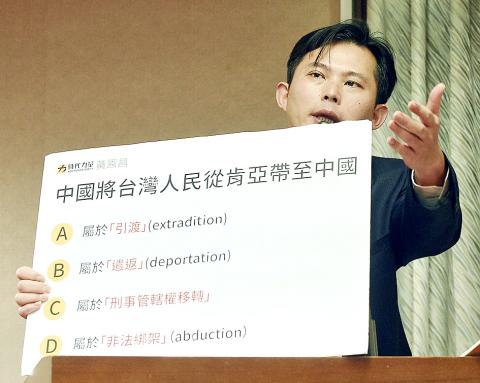After reeling from criticism and public pressure, officials at the Ministry of Justice reversed their stance on the deportation of Taiwanese from Kenya to China, making public statements yesterday to say that Taiwan has legal jurisdiction over its citizens and needs to negotiate with China on the handling of the suspects.
Deputy Minister of Justice Lin Hui-huang (林輝煌) said it came down to an issue of “concurrent jurisdiction,” in that both Taiwan and China have legal jurisdiction with regard to such cases and therefore it must be handled by cross-strait negotiations.
In the Kenya case, in which the suspects allegedly engaged in telecoms fraud, “Taiwan has jurisdiction because it involves Taiwanese nationals, but China insists that it has jurisdiction because the victims are Chinese nationals,” Lin said.

Photo: Chen Chih-chu, Taipei Times
Under such conditions of “concurrent jurisdiction,” the states involved must convene negotiations, he said at the legislature in Taipei.
“Therefore, our ministry will work with the Mainland Affairs Council and the Ministry of Foreign Affairs to attain the result that conforms to the law, while respecting our nation’s dignity and sovereignty,” he said.
Legislators lambasted ministry officials, in particular Tai Tung-li (戴東麗), deputy director of the ministry’s Department of International and Cross-Strait Legal Affairs, who on Tuesday suggested that Beijing had the legal right to deport the Taiwanese to China.

Photo: Chen Chih-chu, Taipei Times
“In the Kenya incident, the whole nation should unite together to help our fellow citizens, but we have some government officials who are letting us down,” Democratic Progressive Party (DPP) Legislator Lo Chih-cheng (羅致政) said. “Tai said China taking our citizens by force from Kenya conforms to principles of international criminal jurisdiction. Why did she take China’s side?”
Fellow DPP Legislator Tsai Shih-ying (蔡適應) questioned Tai’s stance that China’s move conformed to international law.
Tai responded by saying that China has jurisdiction in the case, while Taiwan also has jurisdiction.
China’s Taiwan Affairs Office spokesman An Fongshan (安峰山) yesterday said that Taiwanese should look at the issue from the victims’ viewpoint.
“These offenders carried out their criminal activities in a foreign country. Victims were all Chinese residents, so of course, China has jurisdiction in this case,” An said.
An said China’s justice agencies would conduct a thorough and detailed investigation, during which the legal rights of the Taiwanese suspects would be protected.
He added that many Chinese citizens were victims of the fraud, including the elderly, teachers, students, farmers, laborers and pensioners, some of whom lost their life savings, lost money they needed to treat illnesses or even committed suicide.
Officials at the Chinese Ministry of Public Security yesterday said that they have jurisdiction to investigate the group of suspects.
“In these cases, when Taiwan and China handle it separately, these criminals often do not receive their deserved punishment and we cannot give the defrauded money back to the victims,” the officials said.
In the past two years, officials said Kenyan authorities had arrested 67 people from China and 50 from Taiwan in two major busts of telecom fraud rings targeting people living in Beijing, Jiangsu, Sichuan, Hunan and five other Chinese provinces.

Right-wing political scientist Laura Fernandez on Sunday won Costa Rica’s presidential election by a landslide, after promising to crack down on rising violence linked to the cocaine trade. Fernandez’s nearest rival, economist Alvaro Ramos, conceded defeat as results showed the ruling party far exceeding the threshold of 40 percent needed to avoid a runoff. With 94 percent of polling stations counted, the political heir of outgoing Costa Rican President Rodrigo Chaves had captured 48.3 percent of the vote compared with Ramos’ 33.4 percent, the Supreme Electoral Tribunal said. As soon as the first results were announced, members of Fernandez’s Sovereign People’s Party

EMERGING FIELDS: The Chinese president said that the two countries would explore cooperation in green technology, the digital economy and artificial intelligence Chinese President Xi Jinping (習近平) yesterday called for an “equal and orderly multipolar world” in the face of “unilateral bullying,” in an apparent jab at the US. Xi was speaking during talks in Beijing with Uruguayan President Yamandu Orsi, the first South American leader to visit China since US special forces captured then-Venezuelan president Nicolas Maduro last month — an operation that Beijing condemned as a violation of sovereignty. Orsi follows a slew of leaders to have visited China seeking to boost ties with the world’s second-largest economy to hedge against US President Donald Trump’s increasingly unpredictable administration. “The international situation is fraught

MORE RESPONSIBILITY: Draftees would be expected to fight alongside professional soldiers, likely requiring the transformation of some training brigades into combat units The armed forces are to start incorporating new conscripts into combined arms brigades this year to enhance combat readiness, the Executive Yuan’s latest policy report said. The new policy would affect Taiwanese men entering the military for their compulsory service, which was extended to one year under reforms by then-president Tsai Ing-wen (蔡英文) in 2022. The conscripts would be trained to operate machine guns, uncrewed aerial vehicles, anti-tank guided missile launchers and Stinger air defense systems, the report said, adding that the basic training would be lengthened to eight weeks. After basic training, conscripts would be sorted into infantry battalions that would take

GROWING AMBITIONS: The scale and tempo of the operations show that the Strait has become the core theater for China to expand its security interests, the report said Chinese military aircraft incursions around Taiwan have surged nearly 15-fold over the past five years, according to a report released yesterday by the Democratic Progressive Party’s (DPP) Department of China Affairs. Sorties in the Taiwan Strait were previously irregular, totaling 380 in 2020, but have since evolved into routine operations, the report showed. “This demonstrates that the Taiwan Strait has become both the starting point and testing ground for Beijing’s expansionist ambitions,” it said. Driven by military expansionism, China is systematically pursuing actions aimed at altering the regional “status quo,” the department said, adding that Taiwan represents the most critical link in China’s